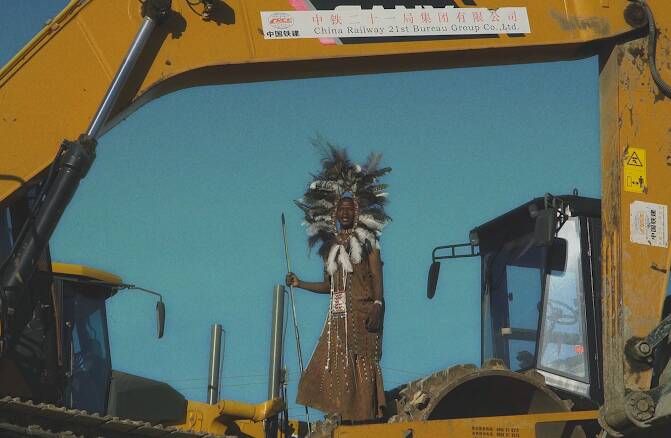The Kenyan singer, multi-instrumentalist, and luthier, Papillon, takes flight with “Maisha Ya Babu” a call to return to our roots.
In Kenya, Martin Murimi, alias Papillon, worries that traditions are gradually disappearing. The question is one that has long worried his contemporaries on the continent, and he has decided to respond by going back to his roots with “Maisha Ya Babu” (Our Father’s Life).
Construction machinery, rubbish trucks, heavy traffic, pollution. The music video was shot in a Nairobi suburb – not the nicest of settings – in order to underline ‘the strong contrast between our tribal history and our present reality – urbanised and westernised’, according to the German-Nigerian director and designer Sydney ‘Spaceship’ Nwakanma. Adorned with regal costumes, headdresses and masks from the collection of the African Heritage House in Nairobi – where the two artists became friends during a residency – Papillon stands out in the heart of this urban chaos.
‘During the filming people stopped to look at him, very surprised to see this pan-African wizard dressed in outfits from the four corners of the continent, this figure so out of touch with their reality,’ recounts Nwakanma. Accompanied by his Mwari wa Ur, a home-made carved lyre harp, Papillon sings in Mbeere of his pain, of memories of his ancestors’ time, of a lost unity, and of his nostalgia, all to the backdrop of luminous choirs and minimalist arrangements. With an angelic voice, whose falsetto resembles that of Blick Bassy or Bongeziwe Mabandla, he asks himself ‘what happened?’ ‘Globalisation!’ replies the director. ‘Codified traditions and cultures are clashing with capitalist forces, and whilst we make more and more cheap clothing and cheap music, we are forgetting our heritage, the value of work, of handcraft.’ Papillon adds, ‘today, traditions have become merely symbolic, few people practice them. It’s sad, but there is hope because a few of us who are truly rooted can remind others that they too have roots. That’s what this song is about.’
‘In our grandfathers’ life there was no evil’. Despite lyrics that tend to suggest otherwise, the singer, multi-instrumentalist, and instrument maker nonetheless refuses to idealise ancestral values and traditions. Born in a small village three hours from Nairobi, Papillon grew up in a poor rural environment, close to the music but also to the rituals and ceremonies of the Mbeere – the Bantu people of East Africa, whose vibrancy has gradually declined over the past twenty years. Although he now lives in Nairobi, the thirty-something still feels sustained by his heritage and, therefore, his truth, thanks to many trips to and from the village. But, by way of a caveat he tells us that ‘I represent my tradition, but I’m not a traditional musician, I’m very contemporary’.
The man is ready to take flight with “Maisha Ya Babu”, a great foretaste of a first album that is to come out later this year. Following in the footsteps of his late mentor Ayub Ogada, a modern virtuoso of the nyatiti lyre harp and a keen experimenter, Papillon surrounds himself with a group of free-spirited musicians mixing tablas, flutes, pianos, steel drums, and other percussion instruments. Their job is to accompany him in the creation of a ‘new musical dynasty with traditional Africa at its heart’. And that’s a promise!




